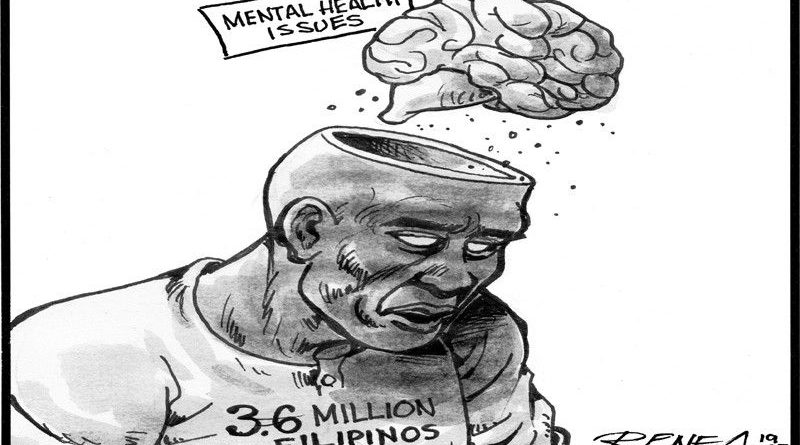EDITORIAL – Stress in the time of COVID
.
Sick Earth-Plague Day 325
THE EDITOR

There is another aspect of the COVID pandemic that has yet to be properly addressed: its impact on mental health.
All agencies and advocacy groups involved in mental health issues have reported a spike in cases of psychological distress since lockdowns were imposed in mid-March to contain the spread of the coronavirus.
A survey undertaken by the Department of Health showed that about 3.6 million Filipinos are suffering from various forms of mental disorders. The study conducted by the National Mental Health Program of the DOH covered disorders involving mental, neurological and substance use.
Program manager Frances Prescilla Cuevas noted last week that the actual number could be higher, considering that only three types of disorders were covered by the study. The largest number of calls or reports for help recorded – over 1.1 million – came from people suffering from depression. People with alcohol use disorders came second, followed by those suffering from bipolar or drug use disorders, epilepsy and schizophrenia.
The crisis hotline of the National Center for Mental Health as well as private suicide prevention hotlines have also reported a spike in calls for help since quarantine restrictions were imposed. Cuevas said most of the callers to the NCMH hotline were women aged 18 to 30 years old.
Policy makers recognized the problem long before the pandemic, with Republic Act 11036, the National Mental Health Act, being signed into law in 2018 and the implementing rules and regulations released months later. Companies are mandated to provide mental health programs for employees. The country, however, has an acute lack of mental health care professionals. And even when counseling is available, many people are reluctant to seek help for mental health issues. The lingering social stigma attached to mental disorders makes those afflicted reluctant to seek help until their problems have reached an advanced stage.
Health officials have emphasized the seriousness of mental distress, which can drive people of all ages to commit suicide. The pandemic has created highly stressful situations – the loss of jobs and livelihoods, separation from loved ones and friends, or heightened tensions in the household, apart from the constant worry about COVID infection.
As in physical illnesses, timely and effective intervention is needed to ease mental distress. The government must boost resources for providing mental health care, including training more personnel for professional counseling and as first responders in serious cases. Religious groups, schools and communities can work together to provide a support network. The message bears repeating: it’s OK to not be OK, and people must seek help for mental health care.


SIGN UP TO RECEIVE OUR EMAIL
.
The most important news of the day about the ASEAN Countries and the world in one email: [email protected]










